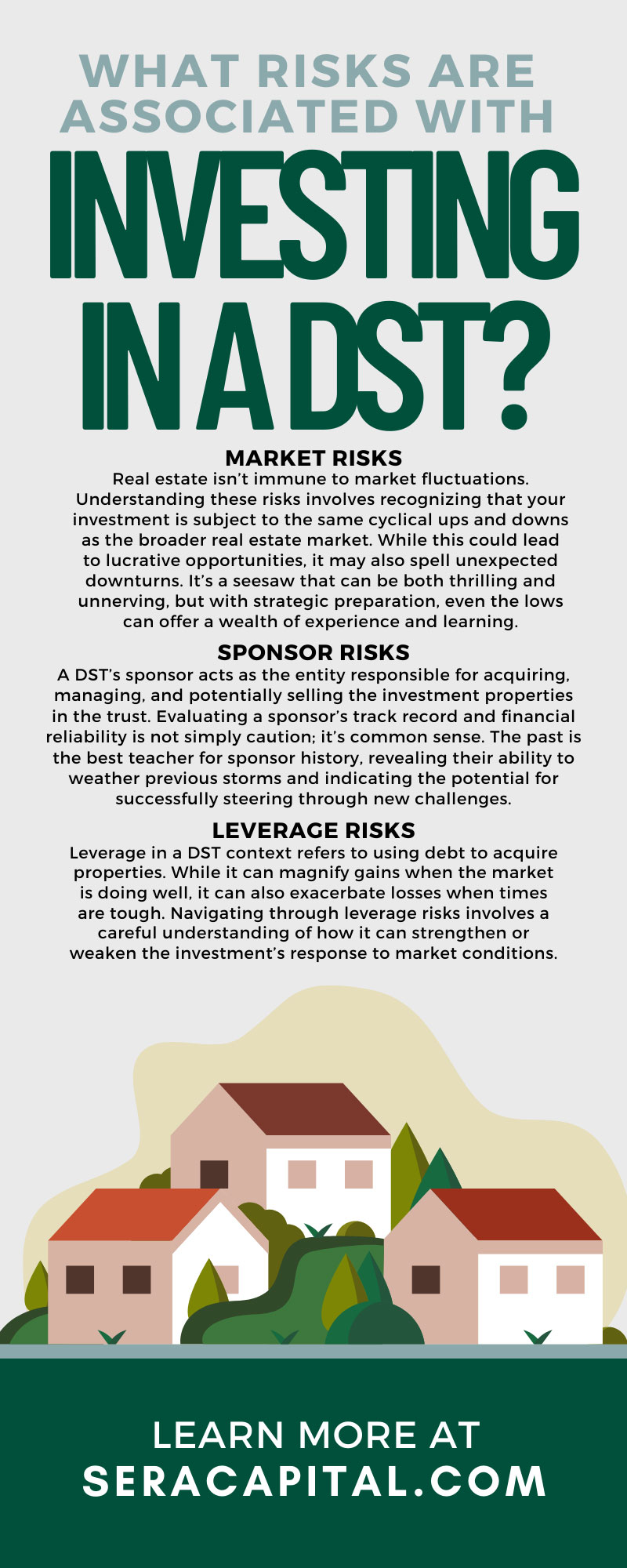What Risks Are Associated With Investing in a DST?

Carl E. Sera, CMT
April 30, 2024
Investing in a Delaware Statutory Trust (DST) can offer real estate investors a path to potential income and equity growth without the day-to-day management responsibilities. However, like any investment, DSTs have associated risks that can significantly impact your financial portfolio. Whether it’s market volatility, sponsor reliability, or the intricacies of tax laws, understanding these risks is paramount to making informed investment decisions. This blog will explore the risks associated with DSTs.
Understanding the Risks
Before you set sail into the world of DSTs, it’s essential to acquaint yourself with the various risks that may arise.
Market Risks
Real estate isn’t immune to market fluctuations. Understanding these risks involves recognizing that your investment is subject to the same cyclical ups and downs as the broader real estate market. While this could lead to lucrative opportunities, it may also spell unexpected downturns. It’s a seesaw that can be both thrilling and unnerving, but with strategic preparation, even the lows can offer a wealth of experience and learning.
Sponsor Risks
A DST’s sponsor acts as the entity responsible for acquiring, managing, and potentially selling the investment properties in the trust. Evaluating a sponsor’s track record and financial reliability is not simply caution; it’s common sense. The past is the best teacher for sponsor history, revealing their ability to weather previous storms and indicating the potential for successfully steering through new challenges.
Leverage Risks
Leverage in a DST context refers to using debt to acquire properties. While it can magnify gains when the market is doing well, it can also exacerbate losses when times are tough. Navigating through leverage risks involves a careful understanding of how it can strengthen or weaken the investment’s response to market conditions.
Property Risks
The depth of any real estate investment is, quite literally, the property’s quality and circumstances. The physical condition, location, and local market conditions are all substantial property risks that you should scrutinize. This focus is where attention to granular detail can pay dividends or save you from sinking into many unforeseen property issues.
Legal and Tax Risks
DST investments’ legal and tax implications aren’t things to trifle with. Explore the legal and tax risks that can accompany a DST.
Tax Laws
Changes in tax laws can swiftly alter the tax benefits associated with DST investments. This dynamic tax environment necessitates a flexible and updated approach to tax planning within the context of DST investments. Staying current with these changes and their potential impact is crucial to your investment strategy.
Legal Issues
The structure and management of DSTs can sometimes expose investors to legal issues. Clarity on the documents and the trust’s legal structure is indispensable. Potential legal risks could include administrative and management hurdles and even litigation, so a watertight understanding of these aspects is necessary before committing to a DST investment.
Risks Associated With 1031 DSTs
Investing in a Delaware Statutory Trust (DST) as part of a 1031 exchange carries a unique set of risks that investors must consider carefully. The 1031 exchange provision allows real estate investors to defer capital gains taxes on property sales, provided they reinvest those proceeds into like-kind property. While DSTs qualify as like-kind property for these exchanges, the process introduces several complexities and risks.
Strict Timelines
Strict timelines govern 1031 exchanges; investors must identify a replacement property within 45 days and complete the acquisition within 180 days of selling their original assets. DSTs, while offering a viable solution for timely reinvestment, may pressure investors into making rushed decisions, potentially leading to overlooked due diligence.
Less Control Over Investment Decisions
There’s a risk associated with relinquishing direct control over investment decisions. When investors contribute their exchange proceeds to a DST, they entrust the DST’s sponsor with the property’s selection, management, and eventual sale. Although this can relieve investors from day-to-day management burdens, it also places significant trust in the sponsor’s expertise and fiduciary responsibility.
Reduced Liquidity
Another concern is the potential for reduced liquidity. Investors looking to exit a DST before the trust’s dissolution may find selling their interest in the secondary market challenging. This reduced liquidity can be particularly problematic for investors needing to access their capital for unforeseen reasons.
While 1031 DSTs offer a pathway for real estate investors to defer capital gains taxes and possibly diversify their investment portfolios, the intricacies of these investments warrant a thorough risk assessment. Investors are advised to conduct comprehensive due diligence, consult with financial and tax advisors, and carefully consider their long-term investment goals and risk tolerance before proceeding.
Mitigating Strategies
Mitigating the risks associated with DST investments can provide a secure route to successful investing. Implement these strategies to keep your investment steady in the face of uncertainty.
Diversification
The age-old adage of not putting all your eggs in one basket resonates profoundly here. Diversifying your investments across multiple DSTs or asset classes can help spread out risk, safeguarding against the potential pitfalls of a single investment.
Due Diligence
Conducting thorough due diligence is not merely a suggestion; it’s an imperative for prudent investment. This process involves a deep, investigative approach to understanding the investment opportunity, its components, and its associated risks.
Expert Counsel
Navigating the complexities of DST investments may necessitate the compass and guidance of experienced financial and legal advisors. Their expertise can offer critical perspectives, providing you with the valuable insights needed to make well-informed investment decisions that align with your financial goals and risk tolerance level.
A 1031 exchange advisor will walk you through all the steps to ensure you stay on track. Sera Capital is the leading expert in exit planning. Our advisors are incredibly knowledgeable and understand how to work with individuals as fiduciaries. Trust us—we’re ready to help.
Addressing Common Misconceptions About DSTs
Delaware Statutory Trusts (DSTs) often fall prey to misconceptions that can skew an investor’s understanding and approach in the maze of real estate investments. It’s crucial to dispel these myths to provide a clearer picture of DST investments and ensure informed decision-making.
Misconception #1: DSTs Are Only for High-Net-Worth Individuals
One common misunderstanding is that DSTs are exclusively for the wealthy. It’s true that there are minimum investment requirements. However, they are often lower than those for direct property ownership, making DSTs accessible to a broader range of investors seeking diversification without the need for direct property management.
Misconception #2: There Are No Exit Strategies for DST Investors
There’s a misconception surrounding the liquidity of DST investments. While DSTs are generally considered long-term investments with limited liquidity, investors have exit strategies available, such as the potential sale of the DST interests on secondary markets or the sponsor’s strategic sell-off of properties at opportunistic times.
Investing in DSTs offers the potential for lucrative returns and a gateway to passive real estate investing. With great potential comes great responsibility—and a fair share of risks. Understanding and engaging with the associated DST risks discussed in this comprehensive segment can significantly enhance your ability to chart a successful course through DST investments.
Don’t be afraid to contact Sera Capital for help and counsel. We offer free 20-minute consultations, so contact us today. We look forward to hearing from you soon!

Categories
Strategize Your Success
